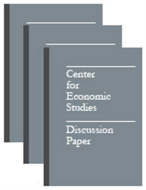Foreign Direct Investment, Geography, and Welfare
Foreign Direct Investment, Geography, and Welfare
Abstract
We study the impact of FDI on domestic welfare using a model of internal trade with variable markups that incorporates intranational transport costs. The model allows us to disentangle the various channels through which FDI affects welfare. We apply the model to the case of Ethiopian manufacturing, which received considerable amounts of FDI during our study period. We find substantial gains from the presence of foreign firms, both in the local market and in other connected markets in the country. FDI, however, resulted in a modest worsening of allocative efficiency because foreign firms tend to have significantly higher markups than domestic firms. We report consistent findings from our empirical analysis, which utilises microdata on manufacturing firms, information on FDI projects, and geospatial data on improvements in the road network.
Others in Series
Working Paper
Working Paper
Working Paper




